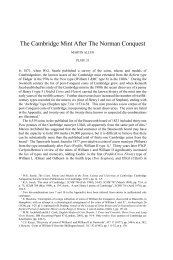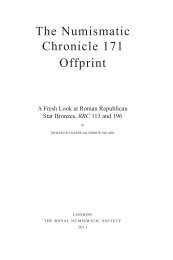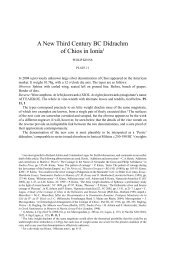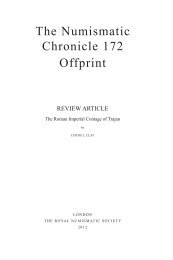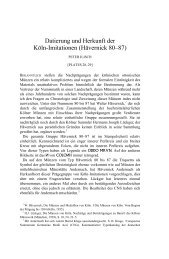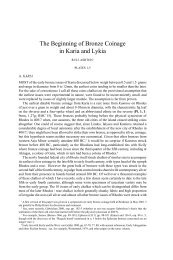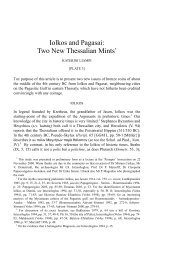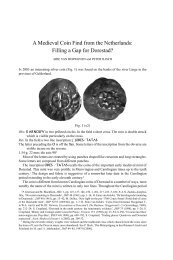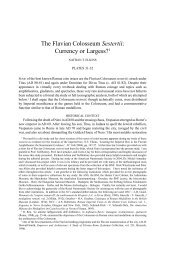The Numismatic Chronicle 171 Offprint - Royal Numismatic Society
The Numismatic Chronicle 171 Offprint - Royal Numismatic Society
The Numismatic Chronicle 171 Offprint - Royal Numismatic Society
You also want an ePaper? Increase the reach of your titles
YUMPU automatically turns print PDFs into web optimized ePapers that Google loves.
390<br />
FRANÇOIS THIERRY<br />
‘year of great abundance’ (dayou nian 大有年), with the description ‘last year the<br />
fi ve grains matured to perfection’ (xi sui wu gu deng yan 昔歲五穀登衍) and the<br />
annotation reading ‘when the fi ve cereals all reach maturity, one writes of a year of<br />
great abundance’ (wu gu jie shu, shu dayou nian 五穀皆熟,書大有年). 155<br />
<strong>The</strong> combination of these expressions pays homage to the harmony that exists<br />
between Heaven and a good ruler. Heaven provides the peasants with a good climate,<br />
and the ruler fulfi ls his obligations to his people. It also makes reference to the<br />
fundamental role of agriculture in Confucian ideology.<br />
35. 親親,長長,老老,幼幼 Thân thân, trưởng trưởng, lão lão, ấu ấu<br />
Ch. Qin qin, chang chang, lao lao, you you // Love one’s parents, respect one’s<br />
superiors, honour the old, cherish the children.<br />
Inscription found on coins of the Minh Mạng, 156 Thiệu Trị157 and Tự Đức158 eras. On<br />
coins of the Minh Mạng era, the inscription appears in the form 親ㄑ長ㄑ老ㄑ幼ㄑ.<br />
In the Doctrine of the Mean, we fi nd the phrase ‘the principal requirement is to love<br />
one’s parents’ (qin qin wei da 親親為大). 159 In <strong>The</strong> Great Learning, it says: ‘If the<br />
ruler honours his parents, the people will cultivate fi lial piety. If the ruler respects his<br />
elders, the people will cultivate submission’ (shang lao lao er min xing xiao, shang<br />
zhang zhang er min xing ti 上老老而民興孝,上長長而民興弟). 160 We have here<br />
one of the central themes of Confucian philosophy: the social relations between<br />
parents and children, and between superiors and inferiors.<br />
36. 國富兵彊,內安外靜 Quốc phú binh cường, nội an ngoại tĩnh<br />
Ch. Guo fu bing qiang, nei an wai jing // When the state is rich and the army is<br />
strong, there is peace at home, and calm abroad.<br />
Inscription found on coins of the Minh Mạng 161 and Thiệu Trị 162 eras. This type<br />
was dropped during the Tự Đức era, because the character An had become a taboo<br />
character (see type 20).<br />
155 HHS, II, p. 113. <strong>The</strong> list of the fi ve grains, wu gu, was not an established list and varies according<br />
to the text. According to the Zhouli (Zhouli, IV-58, pp. 91–2), they were glutinous millet (shu 黍), nonglutinous<br />
millet (ji 稷), wheat (mai 麥), sesame (ma 麻) and soya (shu 菽).<br />
156 Lacroix, Numismatique annamite, no. 422; Schroeder, Annam. Etudes numismatiques, no. 138; AS,<br />
III, p. 13; CMV, no. 1529; Barker, Historical cash coins of Viêt Nam, no. 149.<br />
157 CMV, no. 1609.<br />
158 Lacroix, Numismatique annamite, no. 475; Schroeder, no. 311; CMV, no. 1794.<br />
159 Zhongyong, XX, p. 45. Legge (Four Books, p. 383) translates this as ‘[Benevolence is the<br />
characteristic element of humanity, and] the great exercise of it is in loving relatives.’<br />
160 Daxue, X, p. 18.<br />
161 Lacroix, Numismatique annamite, no. 409; Schroeder, Annam. Etudes numismatiques, no. 139;<br />
AS, III, p. 9; CMVS, no. 394; Barker, Historical cash coins of Viêt Nam, no. 150. Legge (Four Books, p.<br />
334) translates this as ‘When the sovereign behaves to his aged, as the aged should be behaved to, the<br />
people become fi lial; when the sovereign behaves to his elders, as the elders should be behaved to, the<br />
people learn brotherly submission.’<br />
162 Barker, Historical cash coins of Viêt Nam, no. 170.



